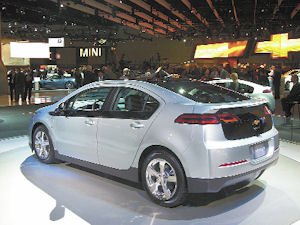The 2009 Los Angeles Auto Show was all about the alternative vehicles and it was much the same at this year’s show, which started Nov. 17 and 18 with the media days preview followed by the 10 days of being open to the public at the Los Angeles Convention Center. Like last year, the Chevrolet Volt electric hybrid vehicle was the talk of the show. Whereas in 2009, the car was just introduced as a concept, this year deliveries will start to dealerships between Thanksgiving and mid-December. General Motors anticipates selling 10,000 of the cars next year, and 45,000 in 2012, said Joel Ewanick, a vice president of marketing with the automaker. In speaking to reporters from the stage at the Chevrolet display, Ewanick called the Volt analogous to the moon landing; saying the vehicle was “epic” and the most sophisticated ever built. If Ewanick’s remarks were heavy on the hyperbole it’s because he knows of what he speaks. Ewanick drove his own Volt from Detroit to Los Angeles for the auto show. Since taking ownership in September, he’s driven more than 1,000 miles yet only filled the gas tank once. Joining the Volt at the auto show was the Nissan Leaf, expected to begin shipping by the end of the year; the high end Karma from carmaker Fisker; and electric vehicle concept cars from SAAB and Toyota and Honda. Some of the concept vehicles, however, may never make it into production, said Jesse Toprak, vice president of industry trends for TrueCar.com, a new car pricing website. “The reason the automakers like to overhype their EVs is because it generates positive and environmentally friendly interest around the brand,” Toprak said. “Also, when they sell these cars it helps with reaching the CAFÉ (fuel economy) standards.” A test fleet of the electric vehicle from Volvo will hit the roads of Southern California this month. People who are conscious about the environment do not want to compromise when it comes to owning a luxury vehicle, said Volvo President and CEO Stefan Jacoby at the Motor Press Guild breakfast, adding, “Why should they?” The electric vehicle is capable of 150 kilometers per charge and was designed so that its lithium ion batteries were centered in the middle away from any crash zones. “A battery operated Volvo must be as safe as any Volvo car,” Jacoby said. Galpinized On the media days all the attention goes to the new model introductions taking place in the two main halls at the convention center. So Kentia Hall, on the lower level, where the after-market suppliers, performance vehicles and motoring accessories are located, tends to be empty other than the representatives of the businesses displaying there. When the auto show opens to the public the hall becomes a fun -and crowded – place, said Brian Allan, general manager with Galpin Premier Collection. “They will see a lot of exciting stuff,” Allan said. “They get to see cars taken to another level they will rarely ever see.” Galpin Auto Sports brought 21 vehicles to the show to display the unique and customized work done at its shop in North Hills. Galpin Auto Sports has expanded its customized work to brands other than those sold by Galpin Motors, such as Rolls Royce and Lamborghini. Still, Allan said, many of the cars on display were variations of the Ford Mustang, the most popular car that gets customized. At the auto show, there was a one of kind 2011 Mustang convertible with a retractable hard top roof. Also on display were a 75th anniversary Jaguar sedan; a 1967 Chevelle owned by a Valley businessman that was restored and modified; a 2011 Ford Fiesta with original black and white designs applied with vinyl graphics; and a Mustang widened by 12 inches with all metal. “In L.A. so many people have so many cars it’s good to see how you can personalize it,” Allan said. Galpin also had a presence in the concourse hall, taking over the Aston Martin display when the automaker decided not to attend this year’s show. Fuel Injection R&D Even with all the talk about electric vehicles, the internal combustion engine isn’t going away anytime soon. Making those engines more fuel efficient is what Transonic Combustion is doing in developing a new fuel injection system. Transonic Combustion, based in Camarillo, is still in the research and development stage and expects to be there for another couple of years. The earliest its fuel injection system would see production is 2015. A lengthy gestation time is not unusual in the auto industry where there is zero tolerance for errors and breakdowns, said company President and CEO Wolfgang Bullmer. “It is very high demanding in terms of quality and reliability and it takes a while to get into mass production,” Bullmer said. Without getting too technical, what makes the Transonic Combustion fuel injection system different from the one in use now is that the fuel gets into a state between a gas and liquid and by injecting that into the cylinders of the engine there is a more efficient conversion of heat into mechanical energy to move the vehicle. The result is close to the fuel efficiency of diesel vehicles without having to use diesel fuel, Bullmer said. The company has been noticed by automakers both in the U.S. and abroad. European and Asian carmakers are interested because they are more conscious of fuel consumption because of the price of gas. “We have practical reasons to be optimistic about our technology,” Bullmer said. Staff Reporter Mark Madler can be reached at (818) 316-3126 or by e-mail at [email protected]. The Chevy Volt would have to be roomier before he buys one.
